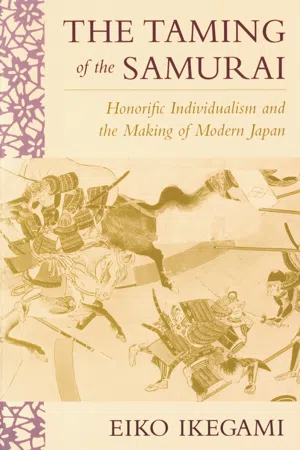
The Taming of the Samurai
Honorific Individualism and the Making of Modern Japan
- English
- ePUB (mobile friendly)
- Available on iOS & Android
About this book
Modern Japan offers us a view of a highly developed society with its own internal logic. Eiko Ikegami makes this logic accessible to us through a sweeping investigation into the roots of Japanese organizational structures. She accomplishes this by focusing on the diverse roles that the samurai have played in Japanese history. From their rise in ancient Japan, through their dominance as warrior lords in the medieval period, and their subsequent transformation to quasi-bureaucrats at the beginning of the Tokugawa era, the samurai held center stage in Japan until their abolishment after the opening up of Japan in the mid-nineteenth century.
This book demonstrates how Japan's so-called harmonious collective culture is paradoxically connected with a history of conflict. Ikegami contends that contemporary Japanese culture is based upon two remarkably complementary ingredients, honorable competition and honorable collaboration. The historical roots of this situation can be found in the process of state formation, along very different lines from that seen in Europe at around the same time. The solution that emerged out of the turbulent beginnings of the Tokugawa state was a transformation of the samurai into a hereditary class of vassal-bureaucrats, a solution that would have many unexpected ramifications for subsequent centuries.
Ikegami's approach, while sociological, draws on anthropological and historical methods to provide an answer to the question of how the Japanese managed to achieve modernity without traveling the route taken by Western countries. The result is a work of enormous depth and sensitivity that will facilitate a better understanding of, and appreciation for, Japanese society.
Frequently asked questions
- Essential is ideal for learners and professionals who enjoy exploring a wide range of subjects. Access the Essential Library with 800,000+ trusted titles and best-sellers across business, personal growth, and the humanities. Includes unlimited reading time and Standard Read Aloud voice.
- Complete: Perfect for advanced learners and researchers needing full, unrestricted access. Unlock 1.4M+ books across hundreds of subjects, including academic and specialized titles. The Complete Plan also includes advanced features like Premium Read Aloud and Research Assistant.
Please note we cannot support devices running on iOS 13 and Android 7 or earlier. Learn more about using the app.
Information
Index
Table of contents
- Cover
- Title
- Copyright
- Acknowledgments
- Contents
- Illustrations
- I. A Sociological Approach
- II Origins in Violence
- III Disintegration and Reorganization
- IV The Paradoxical Nature of Tokugawa State Formation
- V Honor and Violence in Transformation
- VI Honor Polarization in Vassalic Bureaucracy
- VII Honorific Individualism and Honorific Collectivism
- Epilogue
- Notes
- Index